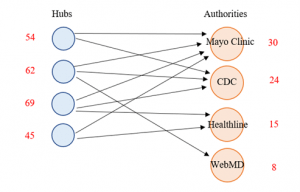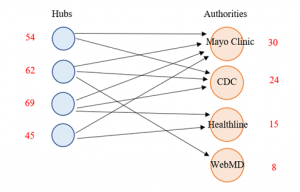Hubs, Authorities, and Googling Your Symptoms
We’ve all been there – waking up to a sore throat, getting a random headache at 5pm, or feeling a strange ache in your big toe. For most of us, the first thing we do is hop on Google and search our symptoms. We know this is not what we’re supposed to do, but why exactly is it so bad? It turns out that networks play a huge role in the reason Googling symptoms is a bad idea.
Psychologists have coined a term for the feeling of increased anxiety when reading about symptoms online: cyberchondria (1). It is common knowledge that many health-related websites lack reliability – when Googling for something as simple as a headache, you are almost guaranteed to find a source that says you have cancer. Usually, when reading about an initial symptom, anxiety will increase, leading to further web searches about this symptom. In fact, according to a Microsoft study, people will usually see the first diagnosis and use it as a starting point, automatically assuming it is correct no matter how drastic or serious the diagnosis is (2). Medical professionals do say, though, that Googling symptoms can be a good starting point to determine whether or not you need emergency help. However, in the majority of cases, Googling symptoms only leads to a rabbit hole of searches and anxiety about serious diseases that are mostly always irrelevant. The same Microsoft study determined that “reliance on the rankings of Web search results contributes a similar bias to the judgements people make about illness (2) – this is where knowledge of networks comes in.
Web search consists of a set of Hubs and a set of Authorities. In the case of a web search for, for example, a sore throat, some possible Authorities are Mayo Clinic, the CDC, Healthline, and WebMD. These Authorities have a number of Hubs pointing to them, and the number of Hubs pointing to them and the number of Authorities each Hub points to affects the total scores. Running the Authority Update Rule and then the Hub Update Rule lets us determine the scores of a website, which ultimately determines the rankings that search engines use to rank websites in the order they appear when something is searched. Here is an example of scores for the Authorities listed above for the search “sore throat” (after 2 rounds of updates).
Then, we normalize the Hub and Authority scores by dividing by the total Hub Score and total Authority Score, respectively. In this example, we get the following normalized scores:
So, when people see the first search result under a particular search term such as “sore throat,” they assume that because it is ranked in the highest position for that search term, it must be reliable. If, for example, the Mayo Clinic page contains false information, even though it has the highest Authority score, people will take that information to be correct. Thus, when people rely on the rankings of web search to diagnose their illnesses, their bias is heightened, and thus they are more likely to believe a very serious diagnosis for a marginally-as-serious problem. So, while Googling symptoms may be a good starting point for diagnosis, this method should not be used to determine a final self-diagnosis, because of the concept of Hubs and Authorities.
(2)https://www.nytimes.com/2008/11/25/technology/internet/25symptoms.html?searchResultPosition=25


